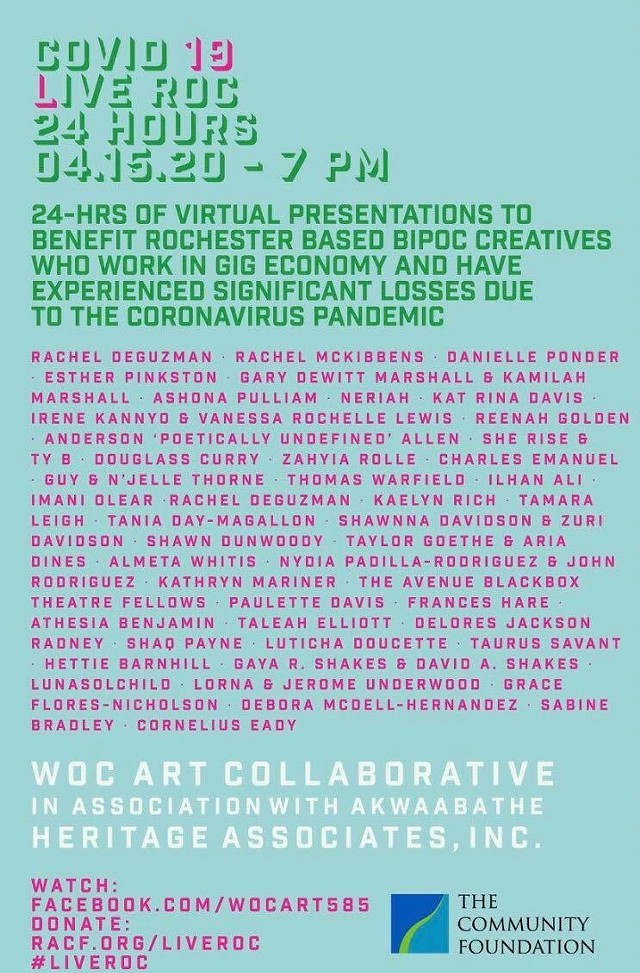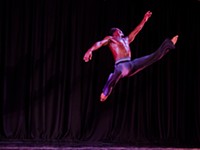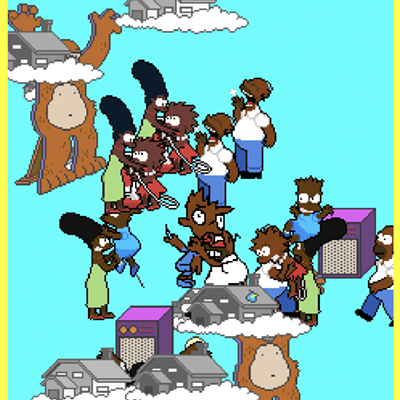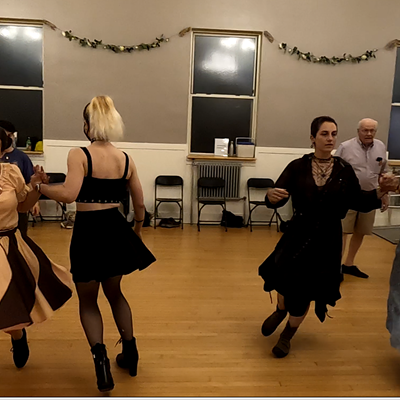Grassroots grants: WOC Art Collaborative hosts 24-hour live fundraiser for BIPOC creatives
By Rebecca Rafferty @rsrafferty[
{
"name": "500x250 Ad",
"insertPoint": "5",
"component": "15667920",
"parentWrapperClass": "",
"requiredCountToDisplay": "1"
}
]
If you know anything about Rochester’s indie creative community, you know it’s full of generous folks who keep one another’s theaters, galleries, and other businesses alive with few resources but loads of mutual support.
It should come as no surprise then that dozens of local artists working in every creative medium — including musician Danielle Ponder, poet Rachel McKibbens, actor and spoken word artist Anderson Allen, dancer and musician Thomas Warfield, storyteller Almeta Whitis, dancer-choreographers Guy and N’Jelle Thorne, comedian Ilhan Ali, and artist Shawn Dunwoody — will volunteer their talents to present “COVID-19 LIVE ROC,” which starts at 7 p.m. Wednesday and ends at 7 p.m. Thursday. The 24-hour streaming event aims to raise funds toward emergency grants for creatives of color impacted by the economic fallout of the coronavirus pandemic.
The multi-generational group of performers will take turns presenting acts over Zoom from their respective homes, and the performances will be streamed over Facebook Live.
The event is free to watch, and while viewers can tune in to watch the full 24 hours, they can also catch individual performances (a schedule can be found here). Throughout the event, viewers can make donations through a dedicated fund organized by Annette Jimenez Gleason at Rochester Community Foundation. The money raised will be dispersed to grant awardees in early May.
Event organizers aim to raise $20,000 during the 24-hour event. An anonymous individual has promised to match up to $15,000 in donations and organizers had already received hundreds of dollars in contributions ahead of the event.
The lineup of more than 40 artistic acts — consisting mostly by members of Rochester’s creative community of color — will present spoken word, music, theatrical, dance, comedy, and art-making performances; yoga sessions; culinary instruction; and film screenings.
Modeled after the Live Aid concerts, the COVID-19 LIVE ROC virtual event was conceived of and initiated by WOC Art Collaborative Executive Director Rachel DeGuzman and produced by WOC Art.
DeGuzman says this endeavor was inspired by an artist she knows who, before the pandemic, made a living teaching five art classes a week, earning $120 for each class. When the shutdowns happened, all of that work was gone, she says. “And they have two children. And anything else they were doing through colleges and universities was canceled for months on.”
Many of the black and brown artists in the Rochester community are either teaching artists or they work in the gig economy, DeGuzman says. “And they don't have any safety net.” Unlike other, larger cities, she adds, Rochester doesn’t have emergency grants in place for creatives.
Aside from raising needed funds for people of color in the creative community, COVID-19 LIVE ROC aims to make the acuteness of the crisis in the black and brown gig arts community more visible, DeGuzman says.
The grant application will be available as soon as the performances close on Thursday evening, and the application period will close on April 23. The panel deciding who the recipients will be — which includes members of Akwaaba Heritage Associates, AKOMA African American Women’s Gospel Choir, and WOC Art Collaborative — will meet on April 25. The organizers plan to distribute funds on May 1.
“Depending on how much we raise, we hope to get $250 to $1,000 grants out,” DeGuzman says. “We're not holding any money for any future anything. This is money in and money out.”
To qualify, applicants will have to provide some minimum documentation that they are in the gig economy, DeGuzman says. For example, someone who taught art classes at an institution can include a link to the class enrollment site in their application.
Applicants’ lost gigs don’t necessarily have to fall into traditionally creative categories, either. For example, an applicant may be a poet or a painter, but have lost work as a bartender during the pandemic. Or they might take on contract work as a creative consultant or a wedding photographer while earning their main income as a restaurant worker.
But salaried employees from shuttered institutions, for example, aren’t qualified applicants. “If you're on the payroll of somebody, there are usually resources that you can get easier,” DeGuzman says. “And I'm not saying that these people are not underpaid and underemployed. But I do think that there's a particular type of creative that is most at risk.”
Unlike some artists’ grants, these will not be project-based, meaning the panel will not require a specific project proposal from those who apply. The money is meant to be used at the discretion of the recipients to support themselves.
“We’re not asking what they’re going to do with it,” DeGuzman says. “They can go buy groceries.”
Though DeGuzman began planning the fundraiser in early March, the programming schedule was completed in the last two weeks. Most of the segments will be about half an hour in length, with a few exceptions that will run a bit longer.
The variety of creative acts for COVID-19 LIVE ROC is in line with the philosophy behind the WOC Arts Collaborative: participants will present creative acts beyond what we traditionally think of as artistic performances. There will be dance and spoken word, but also a “Quarantine Cuisine” cooking tutorial by Debora McDell-Hernandez of Planned Parenthood of Central and Western New York, a meatless cuisine cooking tutorial by playwright and director Grace Flores-Nicholson, and two hour-long guided yoga and meditation sessions by Imani Olear of Yoga for a Good Hood.
Underlying themes that have emerged in the lineup include resistance, education, and centering the self. “Some artists will present work they’ve done on an ongoing basis,” DeGuzman says. “But there also are others who are either presenting work from within their repertoire that is specific to this time we're in, or who actually created programming for this.”
Relevant-to-now acts include “In the Midst of the Storm,” music and live art by performance duo She Rise & Ty B.; Douglass Curry’s “In Case I Don’t See You: blues, poetry, stories, and songs from shut-in to shut-ins"; and dancer-choreographers Guy and N’Jelle Thorne, who will premiere “Mirror Mirror,” a new work depicting what they describe as “a couple’s experimental investigation of a new psychological reality.” A bit of catharsis will be provided via local comedian Ilhan Ali’s set, “Laugh About It: A Comedy Show Where We Vent, Laugh, and Cry Together Because the World is on Fire and We Might As Well Laugh Together.”
Renowned poet Cornelius Eady is based downstate, but he’ll be participating remotely to perform work off his Corona EP, a folksy black country album about the impact of the coronavirus pandemic.
A few of the acts are born of creative endeavors which were thwarted by the pandemic shut-downs, though they have found a temporary home in COVID-19 LIVE ROC. For example, Taylor Goethe and Aria Dines, who are two students studying animation at Rochester Institute of Technology, were set to present the inaugural Women of Color Film Festival this spring at RIT’s MAGIC Studios. DeGuzman says that though Goethe is graduating this year and will move back to California, she’s put her succession plan in Dines’ hands. In the meantime, the two will present a preview via COVID-19 LIVE ROC on Thursday morning at 7 a.m.
“They are people to know,” DeGuzman says. “For people who have generational biases and don't believe in future generations of creatives, I'm afraid I don't agree.”
The multi-generational component of COVID-19 LIVE ROC is critical, DeGuzman says. “I think one of the ways that we inhibit our potential is to create these silos of generations. People of all generations have things to contribute, and that creative collision can happen a really special way when you bring generations together.”
Intergenerational collaboration is found throughout the lineup and also within one act in particular. Shawnna Davidson, a dance instructor and owner of Miracles Dance Center, will present a dance performance and her daughter Zuri will present a TikTok demo.
Zuri Davidson is one of the youngest participants. Some of the more established creative community’s elders, including storyteller Almeta Whitis and playwright and director David Shakes, will present pieces as well.
“I think one of the other things I hope happens is that people who see the performances can also see that even though the communities of color are not always prominently understood, there is a cohesiveness,” DeGuzman says. “And there's a connectivity that really exists beyond the resources that are invested in it. There's also that sense of creating a virtual community when we're all isolated, that feels very good.”
Rebecca Rafferty is CITY's arts & entertainment editor. She can be reached at [email protected].
Speaking of...
-

Mask mandate for New York schools to end Wednesday
Feb 28, 2022 -
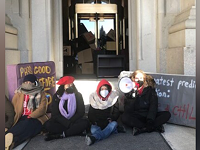
Hochul confirms state's eviction moratorium ends Jan. 15
Jan 12, 2022 -

Hochul: COVID-19 winter surge is here
Dec 17, 2021 - More »
Latest in Art
More by Rebecca Rafferty
-

Beyond folklore
Apr 4, 2024 -

Partnership perks: Public Provisions @ Flour City Bread
Feb 24, 2024 -
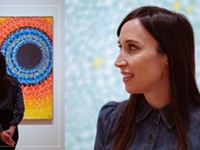
Raison d’Art
Feb 19, 2024 - More »

